
Anton Friedrich Wilhelm von Webern, better known as Anton Webern, was an Austrian composer and conductor whose music was among the most radical of its milieu in its sheer concision, even aphorism, and steadfast embrace of then novel atonal and twelve-tone techniques. With his mentor Arnold Schoenberg and his colleague Alban Berg, Webern was at the core of those within the broader circle of the Second Viennese School.
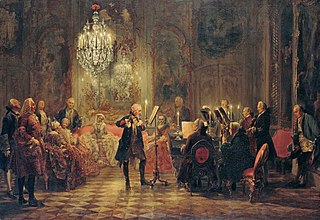
Chamber music is a form of classical music that is composed for a small group of instruments—traditionally a group that could fit in a palace chamber or a large room. Most broadly, it includes any art music that is performed by a small number of performers, with one performer to a part. However, by convention, it usually does not include solo instrument performances.

A string orchestra is an orchestra consisting solely of a string section made up of the bowed strings used in Western Classical music. The instruments of such an orchestra are most often the following: the violin, which is divided into first and second violin players, the viola, the cello, and usually, but not always, the double bass.

Joseph Joachim Raff was a German-Swiss composer, pedagogue and pianist.
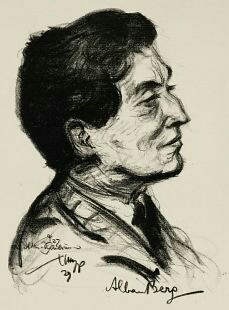
The Lyric Suite is a six-movement work for string quartet written by Alban Berg between 1925 and 1926 using methods derived from Arnold Schoenberg's twelve-tone technique. Though publicly dedicated to Alexander von Zemlinsky, the work has been shown to possess a "secret dedication" and to outline a "secret programme".

Aulis Heikki Sallinen is a Finnish contemporary classical music composer. His music has been variously described as "remorselessly harsh", a "beautifully crafted amalgam of several 20th-century styles", and "neo-romantic". Sallinen studied at the Sibelius Academy, where his teachers included Joonas Kokkonen. He has had works commissioned by the Kronos Quartet, and has also written seven operas, eight symphonies, concertos for violin, cello, flute, horn, and English horn, as well as several chamber works. He won the Nordic Council Music Prize in 1978 for his opera Ratsumies.

Giovanni Sgambati was an Italian pianist and composer.
F major is a major scale based on F, with the pitches F, G, A, B♭, C, D, and E. Its key signature has one flat. Its relative minor is D minor and its parallel minor is F minor.

Leó Weiner was one of the leading Hungarian music educators of the first half of the twentieth century, and a composer.

Dial Records was an American record company and label that specialized first in bebop jazz and then in contemporary classical music. It was founded in 1946 by Ross Russell. Notable artists who recorded for Dial include Charlie Parker, who signed an exclusive one-year recording contract with Russell on 26 February 1946, as well as Miles Davis, Max Roach, and Milt Jackson. Dial Records initially pressed its music for the Tempo Music Shop of Hollywood, California, but soon relocated to New York City.
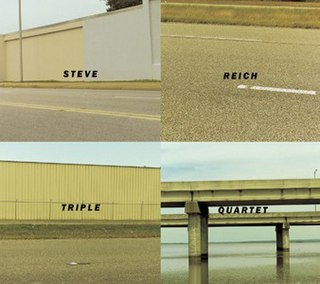
Steve Reich: Triple Quartet is a studio album by the Kronos Quartet and other artists. The music was composed by Steve Reich and was commissioned by the quartet; Reich and the quartet have worked together since 1989.

Kronos Quartet Performs Alfred Schnittke: The Complete String Quartets is a studio album by the Kronos Quartet. The double CD contains all four of Russian composer Alfred Schnittke's "startling" string quartets. String Quartet No.3 was recorded and released in 1988; the other three were recorded between 1994 and 1996 and released in 1998.
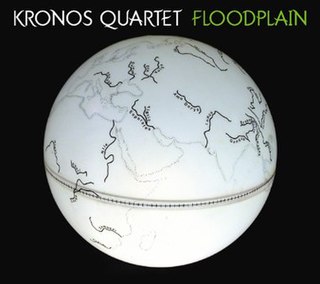
Floodplain is a studio album by the Kronos Quartet released in 2009. All twelve compositions were written or arranged for the quartet.

Henryk Górecki: String Quartets Nos. 1 and 2 is a studio album by the Kronos Quartet, with two compositions by Polish composer Henryk Górecki. The Kronos Quartet had recorded "Already It Is Dusk", his first string quartet, in 1990 and released it on Henryk Mikolaj Górecki: Already It Is Dusk/"Lerchenmusik". The Kronos Quartet recorded and released all three of Górecki's string quartets, the third and last in 2007, on Henryk Górecki: String Quartet No. 3 .
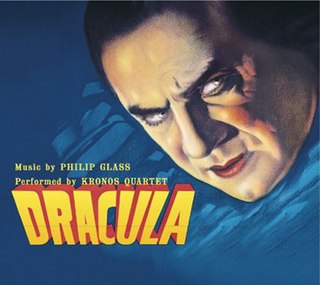
Dracula is a soundtrack performed by the Kronos Quartet, with music composed by Philip Glass, for the 1931 film Dracula.
This is a Nonesuch Records discography, organized by catalog number.
Cyril Huvé is a French classical pianist.














